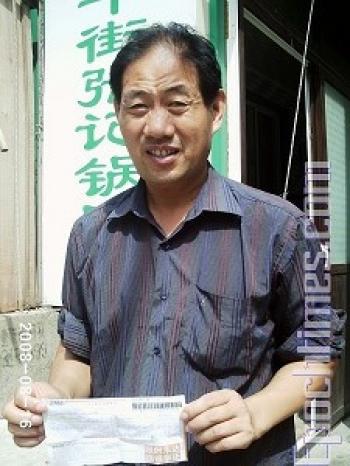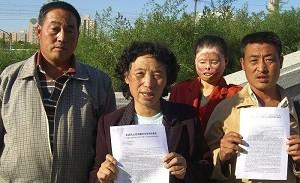CHINA—On Feb. 2, 2007, several dozen people burst into Zhang Junling’s home in Yangpu District, Shanghai. They broke the door and smashed windows in order to force Zhang’s family to relocate. After they left, icy cold winds blew into the house through the broken windows.
Zhang’s mother, an 86-year-old woman, was so shocked that she sat motionless in the cold wind for several hours. How many times has Zhang’s family been forced to relocate in such a violent manner? A dozen times? It’s too many for Zhang to remember.
In 1997, Zhang and his daughter’s house in a downtown area of Hongkou District, Shanghai was forcibly torn down. “When I was not at home, my house was pulled down,” Zhang said. Law enforcement organizations colluded with the developer; people were beaten up; belongings smashed and taken. Most house owners were so frightened they signed the unfair contract and moved to the suburbs. More than 20 families collectively filed a lawsuit in court. But over a dozen families were still forced to relocate, including Zhang’s family.
Several 30-plus-story commercial apartments quickly sprang up where the demolished houses once stood. The original owners were forced to relocate to remote suburbs over 6.2 miles away, or pay a price higher than the market value to move back downtown. According to the final decision from Shanghai Municipal Higher People’s Court, Zhang had to buy a unit with one bedroom and one living room in the original location, provided he could pay the compensated price of 230,000 Yuan (US $29,688). According to the court, the price took into account the value of his old four-story house. According to Zhang, the price is 30,000 yuan (US $3,864) higher than the market value at that time.
Wang Liqing, a Shanghai human rights advocate, told an Epoch Times journalist, “The letters we wrote to Hu Jintao and Wen Jiabao were all handed over to the real estate developers. At that time, the governor of Hongkou District, Xue Quanrong, said, ‘Pull them down. It’s all right even if a dozen people die.’ With the support of regime officials, the real estate developers tore down the houses regardless of whether the residents were willing to move or not.”
“The total invested by the four real estate developers was only 5 million Yuan [US $645,411]. How could they build four buildings worth several hundred million Yuan? They did not have permits to pull down the houses, and neither did they pay for the land,” Zhang said.
Zhang told a journalist that according to his investigation, in exchange for helping the real estate developers, and when the apartments were completed, Mr. Mao, a local police chief who participated in the forced relocation, moved into one of the newly built apartments. Several officials in the district government were also provided with apartments in the same complex.
After the lawsuit failed, Zhang traversed the long road of appeal just as other appellants in China. During this appeal process Zhang started renting the house that he has been living in since 2000.
Zhang’s appeal did bring him some attention. On July 31, 2003, Hongkou District governor Sun Weiguo tried to persuade him to give up his request to move back to his original place with the offer of buying him the house that he is currently living in. Zhang refused.
Since then, his house agent has started to refuse his rent. They told Zhang that the property title has been transferred to the government.
However, in 2004, Zhang was told by the housing agent that the property had been sold to a female judge named Tang Junru. Since then, people often came with copies of a property ownership certificate. They claimed they were Tang’s relatives, and forced Zhang to relocate. Afterwards, Zhang’s family started to experience the violence described in the beginning of this article.
Zhang told a journalist that he was very confident that local authorities were behind the forced relocation because nobody had come to view the house before. If the owner was an everyday person, then they should request the courts to order the relocation, not come by themselves.
Zhang had tried to arrange a meeting with the district governor Sun weiguo to resolve the issue, but Sun refused to meet with him and never replied to his letter.
After experiencing over a dozen violent relocation incidents, Zhang told a journalist that he is worried that one day he may have to sleep on the street with his 86-year-old mother and daughter who is still studying at university.




